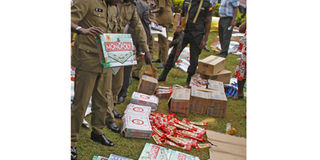54% Ugandan goods defective, survey shows

Confiscated. Police officers display counterfeit goods that were confiscated during an operation in Kampala in 2018. FILE PHOTO
What you need to know:
- The discovery was made during a survey conducted in December last year.
The Uganda National Bureau of Standards (UNBS) has said most Ugandan-made products on the market are substandard.
“In 2018, we undertook a study and found out that 54 per cent of the products are substandard but they are made from Uganda; they are not imported,” the UNBS senior public relations officer, Ms Barbara Kamusiime, told journalists on the sidelines of a stakeholders meeting with manufacturers, importers and traders of construction materials and electronics in Mbarara Town on Wednesday.
Ms Kamusiime said because of that risk, a law was put in place to ensure every locally manufactured product acquires a UNBS quality mark before getting onto the market.
She also said in December 2018, UNBS carried out inspection in Kampala and found out that most electrical products on the market were sub-standard, which forced them to start countrywide sensitisation of consumers and key stakeholders on what is required to buy genuine products.
“There is a very big problem with electrical products in the country. That inspection was basically on electrical products, there is a very huge challenge there,” Ms Kamusiime said.
During the stakeholders’ meeting, Mr Alex Mugisa from Mark Enterprises Ltd wondered why substandard products keep circulating on the Ugandan market yet UNBS claims to be working hard in fighting the vice.
“It is UNBS’ role to ensure that the end users get good quality products. Where do these so called substandard items come from? Why are they still circulating on the market?’’ Mr Mugisa said. He added: “So how long will they keep fighting this? It means UNBS has some loopholes. If they are working, they have check points at the borders and in the factories. These should be enough for them to monitor and see that everything is of good quality and safe to use by the final consumers.”
Ms Jackline Nyakana, a trader, tasked UNBS to ensure that before products come into the country, they are checked and approved since importers and manufacturers pay taxes. “The importers pay money, so what will the money help when the local consumer is not helped to stop defective products?” Ms Nyakana said.



